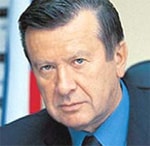 |
|
Zubkov: Putin’s surprise favorite to take over as prime minister. |
In a long-overdue cabinet shuffle, Russian prime minister Mikhail Fradkov submitted his resignation on September 12. Hours later president Vladimir Putin nominated the relatively unknown head of the federal financial monitoring service, Victor Zubkov, to replace him, confounding predictions that first deputy prime minister Sergei Ivanov—generally regarded as the frontrunner in the contest to win Putin’s blessing as the Kremlin’s de facto official presidential candidate—would be given the job. It is unclear whether Putin regards Zubkov, 65 years old and with virtually no public profile, as a potential future president or is simply using him as a placeholder. Similarly murky are the prospects of Ivanov and the other first deputy prime minister, Dmitry Medvedev, who had also been considered a possible presidential contender.
The likelihood of Putin staying in office after the March 2008 elections for an extra-constitutional third term has diminished significantly, although speculation now centers on whether—and if so, how—he will keep the Kremlin throne warm until he can return for a constitutionally permissible additional term in 2012. Meanwhile, attention has shifted to the December parliamentary elections, in which pro-Kremlin parties are widely anticipated to increase their already-dominant majority.
The ripples of the global liquidity crisis reached the Russian capital markets, as overnight rates soared and the central bank pumped liquidity into the banking system. Bond spreads widened and equities dipped, but the underlying strength of the Russian economy and relatively low valuations of the stock market meant that the decline was relatively modest.
US-based coffee-chain giant Starbucks made its long-awaited entrance into the Russian market in August. The company’s efforts were delayed for years by a battle to win back the rights to its name from a Russian trademark squatter. But the company faces entrenched local competition as well as a culture that, although slowly changing, favors tea over coffee.
Kim Iskyan



